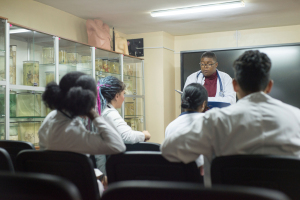by
John R. Fischer, Senior Reporter | January 20, 2020

Only 18 percent of students see education as "very helpful" in their understanding of future healthcare innovations
Despite a greater number of medical professionals seeking additional training for innovations in healthcare, few feel prepared in their ability to become data-driven physicians.
That’s the takeaway of Stanford Medicine’s 2020 Health Trends Report, which examines the maturity of the healthcare landscape, new laws opening patient access to data, and the regulatory approval of AI for medical use. Dr. Lloyd Minor, dean of the Stanford School of Medicine, says that one way of ensuring physicians can manage data-driven tasks is to modernize curricula to teach them how to leverage tools like genetic assessments, wearables, and data science.
"The Health Trends Report Survey indicates that students are already gravitating towards advanced statistics, data science, and population health management classes," he told HCB News. "Educational institutions should align their curriculum with the demand that students have for these sorts or classes. As artificial intelligence, predictive analytics, and other technologies continue to advance in the years ahead, we will ultimately need to find ways to support life-long learning among physicians who are already in the field...Clinicians will need to continue to strengthen our skills in subjects like data science, statistics, and genetic risk assessment – and academic medical centers and employers must evolve to fill that need."



Ad Statistics
Times Displayed: 79541
Times Visited: 2807 Ampronix, a Top Master Distributor for Sony Medical, provides Sales, Service & Exchanges for Sony Surgical Displays, Printers, & More. Rely on Us for Expert Support Tailored to Your Needs. Email info@ampronix.com or Call 949-273-8000 for Premier Pricing.
Surveying 700 physicians, residents and medical students across the U.S., Stanford Medicine found that 47 percent of physicians and 73 percent of students are currently undergoing studies to prepare for future changes in healthcare. Many are pursuing data-oriented subjects such as advanced statistics, genetic counseling, population health, and coding, with 34 percent taking classes on AI. They also expect that almost a third of their tasks will be automated by technology in the next ten years.
The survey found that nearly half of all physicians, students and residents use a wearable health monitoring device, with a majority using the data from it to help make personal health decisions. Eighty percent of physicians and 78 percent of students and residents specified that self-reported data from a patient’s health app would be clinically valuable to their care. Many consider data from patient wearable devices and consumer genetic testing reports to be of clinical value.
Yet, readiness in telemedicine, personalized medicine, and genetic screening among other areas of healthcare is lacking, according to the report. Only 18 percent of current medical students and residents, for instance, rated their education as “very helpful” in preparing them for these developments, while 44 percent of physicians said their education was either “not very helpful” or “not helpful at all.”

